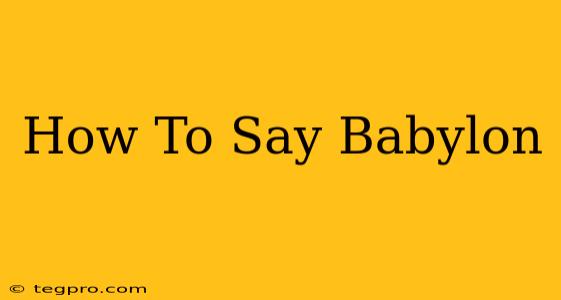The word "Babylon" holds a rich history and resonates differently depending on context. Knowing how to say it correctly, and understanding its nuances, is key to using it effectively. This guide will explore the pronunciation, etymology, and cultural significance of the word "Babylon."
Pronunciation of Babylon
The pronunciation of "Babylon" is relatively straightforward in English. It's typically pronounced as Bab-i-lon, with the emphasis on the first syllable.
- Bab: Pronounced like the first part of "baby."
- i: A short "i" sound, as in "pin."
- lon: Pronounced like "lon" in "colon."
Therefore, a clear and correct pronunciation would sound something like ˈbabɪlɒn.
Variations in Pronunciation
While the above pronunciation is standard in English, slight variations might exist depending on regional accents. However, these variations are usually minor and don't significantly alter the meaning or understanding of the word.
Etymology and Meaning
"Babylon" originates from the Akkadian word Bābili, which ultimately derives from the Sumerian word ka.dingir.ra, meaning "Gate of God." This reflects the city's religious significance in ancient Mesopotamia. Over time, the name evolved through various languages, finally reaching its current form in English.
Cultural Significance
The name "Babylon" carries significant cultural weight. It's often associated with:
- Ancient Mesopotamia: The city of Babylon was a powerful and influential center of civilization known for its advanced architecture, legal codes (like the Code of Hammurabi), and astronomical observations.
- Biblical References: The Bible frequently mentions Babylon, often in contexts of exile, captivity, and the eventual fall of a great empire. This has imbued the word with connotations of decadence, corruption, and upheaval.
- Modern Usage: Today, "Babylon" is sometimes used figuratively to represent a place of moral decay, confusion, or overwhelming complexity. It can also refer to a powerful, seemingly unstoppable system.
Using "Babylon" in Different Contexts
The word's meaning and appropriate usage are heavily dependent on the context.
- Historical discussions: When referring to the ancient city, use the word directly and accurately.
- Figurative language: When using it metaphorically, be mindful of the connotations. Ensure the intended meaning is clear and avoids misinterpretation.
Conclusion
Learning how to correctly pronounce and understand the meaning and implications of "Babylon" is vital for effective communication. Whether you're discussing ancient history, interpreting biblical texts, or using it figuratively, being aware of its historical and cultural significance enhances your understanding and usage of this powerful word.

